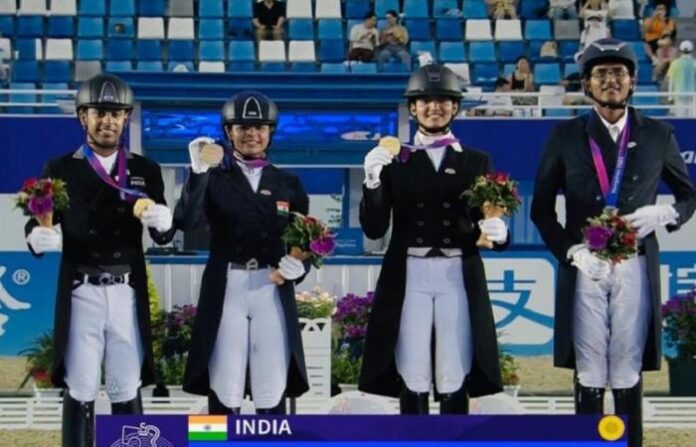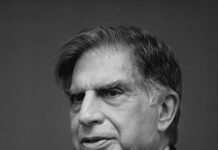The 19th Asian Games held in Hangzhou, China, witnessed a historic moment as India’s Equestrian team, comprised of Divyakriti Singh, Sudipti Hajela, Anush Agarwalla, and Hriday Vipul Chheda, clinched the gold medal in the equestrian dressage team event. This remarkable achievement not only marked India’s first-ever gold in equestrian dressage at the Asian Games but also ended a 41-year-long wait for a gold medal in the sport. In this blog, we delve into the incredible stories of these four talented equestrians, each with their unique journey to success.
Divyakriti Singh: Rising from Adversity
Divyakriti Singh’s path to success was not without its share of challenges. She vividly remembers narrowly missing qualification for the Asian Games at a competitive Dressage show in Crozet, France. The disappointment of falling short despite her best efforts weighed heavily on her. However, looking back, she acknowledges that this setback played a crucial role in her growth as an equestrian.
Born into a well-off family in Jaipur, Divyakriti’s passion for equestrian sports demanded significant financial support. Despite her privileged background, her family had to make considerable investments to fuel her dream. This commitment meant that Divyakriti led a life of dedication, sacrificing social activities, limiting her circle of friends, and missing out on family gatherings and celebrations.
The COVID-19 pandemic further tested Divyakriti’s resilience. Stuck in Denmark during the lockdown, she spent seven days a week caring for her horse, Storm. This intensive period of bonding with her horse not only improved her riding skills but also helped her cope with the isolation and anxiety induced by the pandemic.
Her journey with her current horse, Adrenaline, began in December 2022. Divyakriti was entrusted with the responsibility of caring for and feeding Adrenaline, which deepened her connection with the horse. Their partnership was forged through dedication and countless hours of training, even on challenging mornings in cold, snowy conditions.
Anush Agarwalla: Perseverance Amidst Self-Critique
Anush Agarwalla’s journey to a gold medal at the Asian Games was marked by his relentless self-critique and unyielding determination. Raised in Kolkata, Anush had a happy childhood and began riding horses at Tollygunge, following in the footsteps of his family members.
However, his ultra-competitive nature and inability to accept defeat made his journey challenging. Even after achieving a gold medal at Hangzhou, Anush found it difficult to relinquish his self-critical tendencies and fully embrace the joy and relief of his achievement.
Anush’s family understood his passion for equestrian sports and had the financial means to support his expensive pursuit. This financial backing eventually yielded results when he secured the gold for India. However, Anush faced a series of hurdles, including initial rejection by European trainers due to his skill level.
One moment that pushed Anush into a phase of depression was when he couldn’t qualify for the Asiad team in 2018. His coach at the time delivered a harsh reality check, questioning his capabilities. This rejection and the subsequent failure to make the Tokyo Olympics team left Anush in a dark place, battling depression and self-doubt.
Fortunately, the support of friends and family helped Anush emerge from this difficult phase. He recognized that his drive to succeed, coupled with his critical self-assessment, was also the same force that eventually led him to victory. Anush’s journey to success involved moving to Europe to enhance his riding skills, which brought about a significant transformation in him, both as an athlete and an individual.
Moving to Europe meant embracing independence, a stark contrast to his sheltered life in India. Anush had to learn essential life skills such as cooking and cleaning, which he had never done before. He also became more hands-on in taking care of the horses, a role he hadn’t previously assumed. This newfound independence and skill set contributed to his success in the sport.
Hriday Vipul Chheda: Trusting the Bond with His Steed
Hriday Vipul Chheda’s gold medal-winning moment at the Asian Games was a testament to the deep bond between an equestrian and their steed. Riding Chemxpro Emerald, Hriday faced a unique challenge in the form of scorching heat in Hangzhou.
According to equestrian regulations, events cannot continue if the temperature exceeds 33 degrees. A one-hour halt in the competition seemed inevitable due to the soaring mercury. However, for Hriday and Chemxpro Emerald, competing after the one-hour break would have been detrimental, as horses cannot be put through their exhaustive warm-up routines multiple times a day.
Hriday advocated for the fair treatment of his horse and requested the technical delegates to allow him to compete before the heat intensified. His plea was based on the understanding that his horse couldn’t undergo another half-hour warm-up after an hour’s break. Fortunately, the officials agreed, and Hriday competed, followed by an hour-long break.
As they were about to enter the competition arena, Chemxpro Emerald exhibited signs of nervousness due to the overwhelming atmosphere in the arena. Hriday had to work diligently to regain his steed’s trust, drawing on his extensive experience in horse riding since the age of six. By patiently guiding Chemxpro Emerald and earning his trust through small adjustments and turns, Hriday ensured their victory, highlighting the importance of the rider-horse connection in equestrian sports.
Sudipti Hajela: A Journey Away from Home
Sudipti Hajela’s path to success in equestrian dressage led her far away from home. Based in the French commune of Pamfou, Sudipti trained at Pamfou Dressage, an equestrian center known for its focus on dressage. Her decision to train abroad, specifically in France, stemmed from the need for competitive exposure in Europe, where elite competitions frequently take place. This choice helped save costs on frequent air travel, especially for transporting her steed.
Living in France for over two years, Sudipti adapted to a different lifestyle, one that required her to be more hands-on in caring for the horses in the stables. This level of responsibility was a significant change from her life in India, where she didn’t have to perform as many stable-related tasks.
Training in France presented Sudipti with unique challenges, such as the need to handle various aspects of horse care independently. From cleaning boxes and saddling to padd
Her partnership with her horse, Chinski, had been established long before the Asian Games. Despite the time apart, their bond remained strong. Sudipti’s training in France gave her a different perspective on the sport and instilled in her a sense of independence and self-reliance.
Also Read: Amazon’s Bedrock: Redefining Generative AI with Llama 2 Integration










